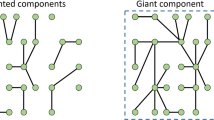Abstract
Evolving signaling systems can be said to induce partitions on the space of world states as they approach equilibrium. Formalizing this claim provides a general framework for understanding what it means for language to “cut nature at its seams”. In order to avoid taking our current best science as providing the adaptive target for all evolving systems, the state space of the world must be characterized exclusively in terms of the coincidence of stimuli and payoffs that drives the evolution of cognitive complexity. Cognition exploits the reliable clustering of events in this space. Using this framework to analyze our ordinary concepts of truth and justification, it appears that while justification can be a simple matter of conforming to historically entrenched strategies, truth cannot be fully specified on the basis of the system’s causal history, but requires a robust clustering in the larger world state space.


Similar content being viewed by others
Notes
Notice that fitnesses in the usual sense are interpreted as probabilities of reproductive success. It is undesirable at this point to include probabilities in our ontology. Though there is no need to do this for our preliminary model, in later versions we will be able to avoid the inclusion of real probabilities by replacing the single fitness parameter per action with individual fitness component parameters involving energy budget, tissue damage, reproductive opportunities, and so forth. Since these are historical fitness contributions, no probabilities are needed.
I am not suggesting that the “justification” here has genuine normative force. Rather, the idea is that the satisfaction of signal production conventions is the subject matter of our statements about justification. I have argued elsewhere (Harms 2004a) that it is not until a system can refer to its own signal production that statements about justification become possible.
References
Barrett, J. A. (2007). Dynamic partitioning and the conventionality of kinds. Philosophy of Science, 74, 527–546.
Dretske, F. (1986). Misinformation. In R. Bogdan (Ed.), Belief: Form, content and function. Oxford: Clarendon Press.
Fielding, A. H. (2007). Cluster and classification techniques for the biosciences. Cambridge: Cambridge University Press.
Godfrey-Smith, P. (1996). Complexity and the function of mind in nature. Cambridge: Cambridge University Press.
Harms, W. F. (2000). Adaptation and moral realism. Biology and Philosophy, 15, 13.
Harms, W. F. (2004a). Information and meaning in evolutionary processes. Cambridge, U.K., New York: Cambridge University Press.
Harms, W. F. (2004b). Primitive content, translation, and the emergence of meaning in animal communication. In K. G. Oller & U. Griebel (Eds.), The evolution of communication systems. Cambridge, MA: MIT Press.
Lewis, D. (1969). Convention. Cambridge, MA: Harvard University Press.
Macdonald, G., & Papineau, D. (2006). Teleosemantics: New philosophical essays. Oxford, New York: Clarendon Press.
Millikan, R. G. (1984). Language, thought, and other biological categories: New foundations for realism. Cambridge, MA: MIT Press.
Rorty, R. (1979). Philosophy and the mirror of nature. Princeton: Princeton University Press.
Skyrms, B. (1996). Evolution of the social contract. Cambridge: Cambridge University Press.
Author information
Authors and Affiliations
Corresponding author
Rights and permissions
About this article
Cite this article
Harms, W.F. Determining truth conditions in signaling games. Philos Stud 147, 23–35 (2010). https://doi.org/10.1007/s11098-009-9448-9
Published:
Issue Date:
DOI: https://doi.org/10.1007/s11098-009-9448-9




